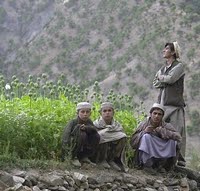On June 26, at a gathering in Kabul marking World Counter Narcotics Day, the mood was somber. Gone was the positive spin of last year's event, when Afghanistan's minister of counternarcotics, Zarar Ahmad Moqbil, proudly announced that poppy cultivation had been reduced by up to 50 percent and that 23 out of 34 provinces were then free from poppy cultivation. Sadly, the significant decrease in opium production last year has since been attributed to a convergence of environmental and climatic variables that devastated the crops late in the season, not to effective counternarcotics measures. According to the United Nations, Afghanistan remains the world's largest producer of illicit opiates and cannabis resin, known as hashish.
With the recent announcement from the U.S. and its NATO allies that they would begin a phased security transition to the Afghan government in anticipation of announced troop withdrawals, many questions remain regarding the establishment of an effective counternarcotics policy and Afghanistan's ability to implement sustainable anti-drug strategies. Most importantly, how will the scale-down of NATO forces and increased responsibility of the Afghan National Security Forces affect the newest iteration of U.S. anti-drug strategies in Afghanistan?
Beginning in 2009, the Obama administration transitioned away from the Bush administration's "Five Pillar Plan" -- a focus on public information, judicial reform, alternative-livelihood development, interdiction and eradication -- toward countering the link between narcotics and the insurgency and attacking the narcotics-corruption-insurgency nexus. Another key difference in President Barack Obama's counternarcotics strategy was the termination of U.S.-contracted forced eradication programs and a renewed emphasis on a costly and complicated expansion of agricultural development assistance. Using the current situation in Afghanistan as a litmus test of how well these strategies might play out during the predicted three-year security transition that kicked off this month, fears over Afghanistan transforming into a full blown narco-state are well-founded.

